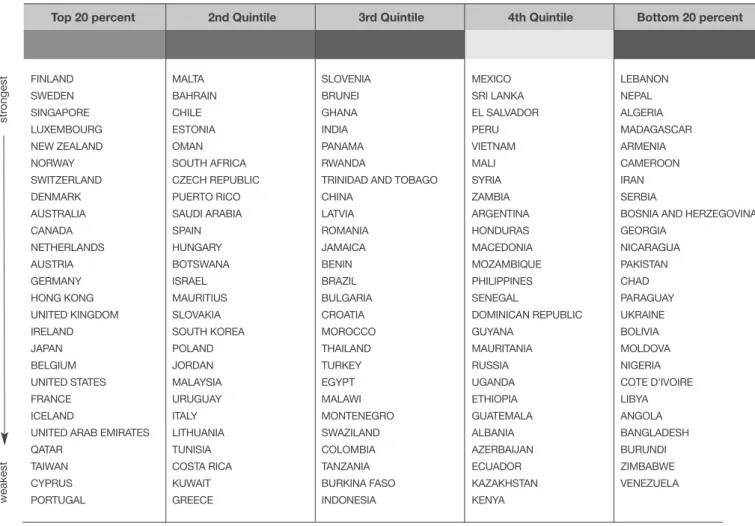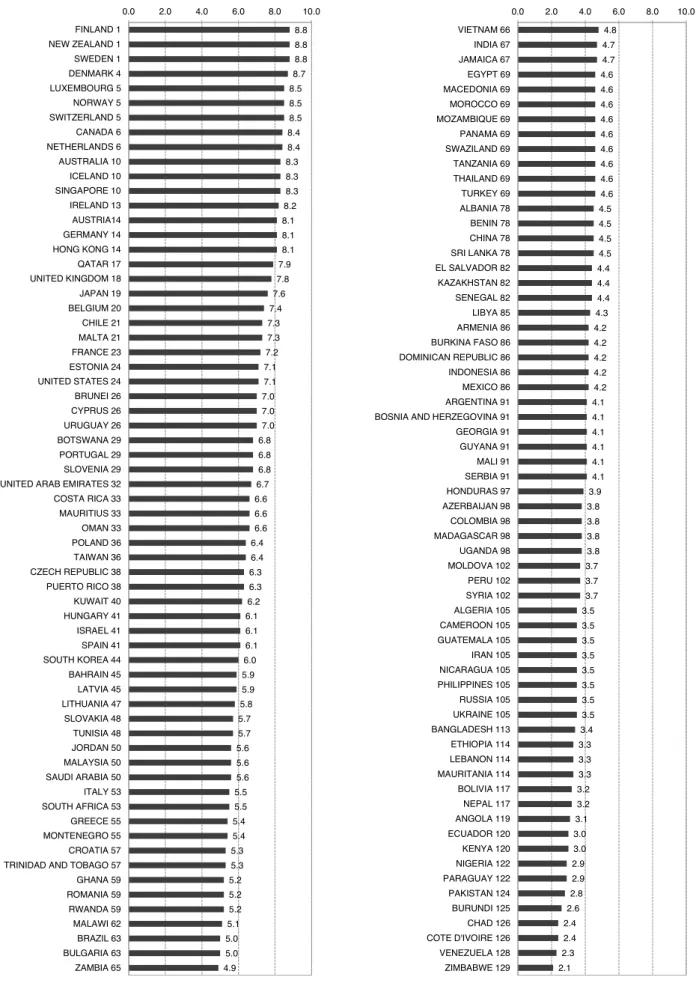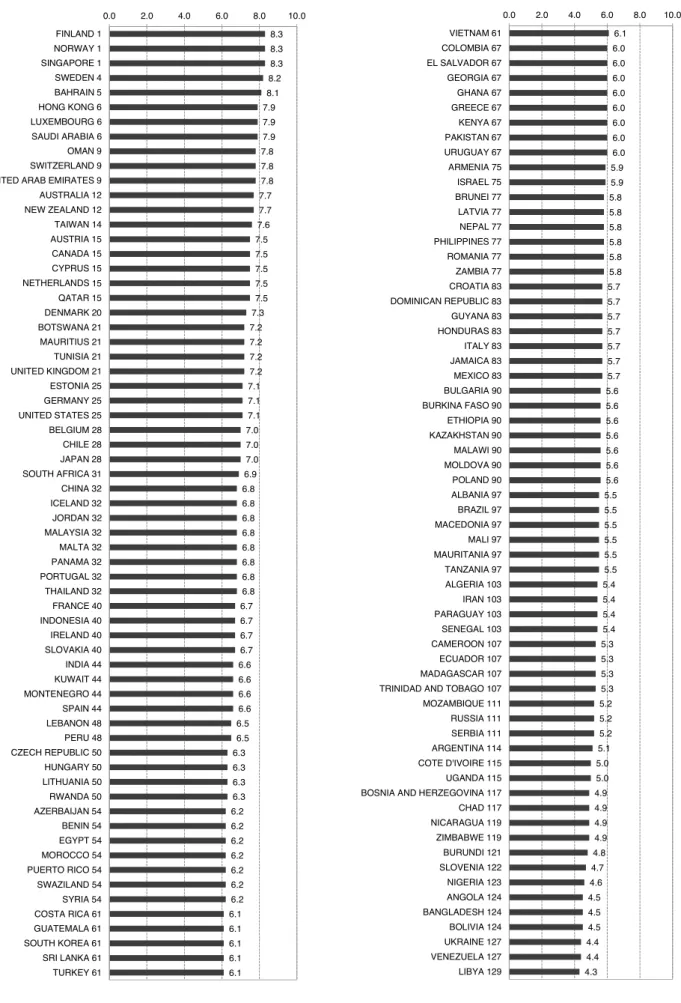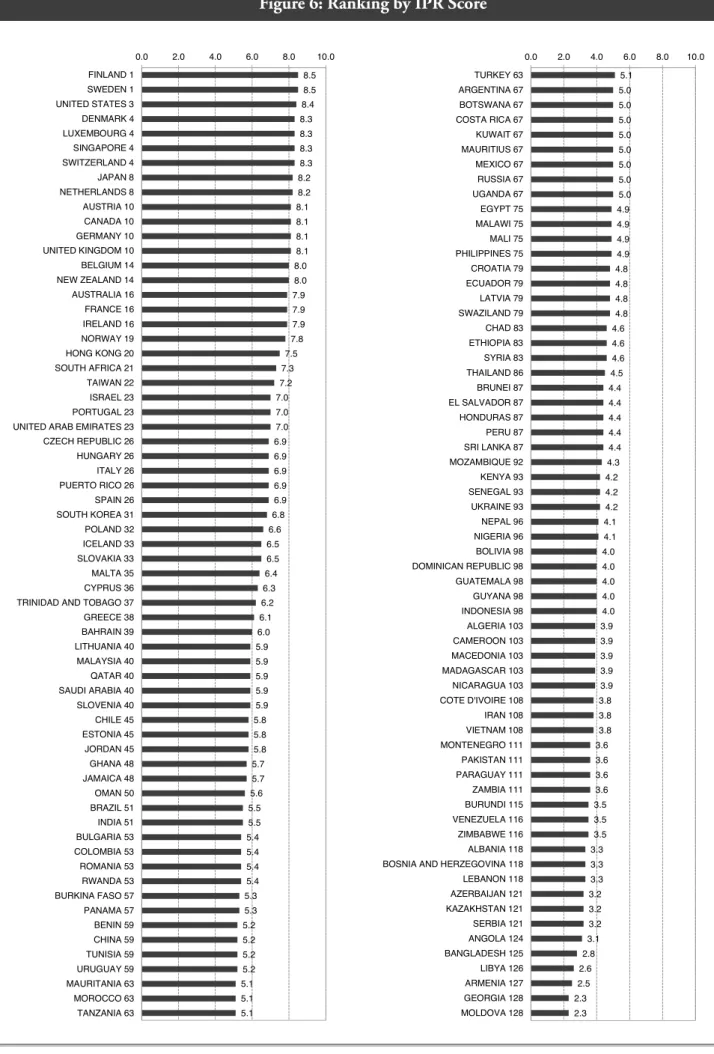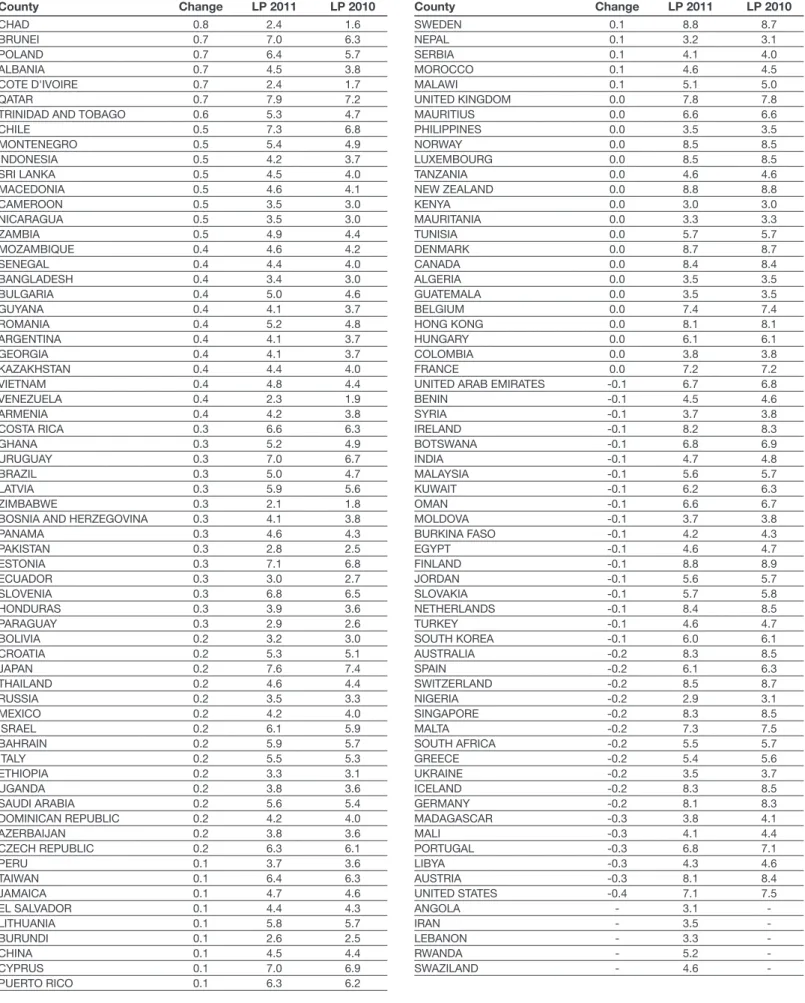A Project of the Property Rights Alliance
I N T E R N A T I O N A L P R O P E R T Y R I G H T S I N D E X
Study conducted by Kyle A. Jackson, 2010 Hernando de Soto Fellow with contributions by:
Marius Doksheim, Joseph Quesnel, Krishna Neupane
Marcos Hidding Ohlson, Martin Krause and Nicole Alpert
Adriatic Institute for Public Policy, Croatia • Albanian Socio Economic Think Tank, Albania • Alternate Solutions Institute, Pakistan • Asociación de Consumidores Libres, Costa Rica • Austrian Economics Cen- ter, Austria • Bishkek Business Club, Kyrgyz Republic • Cathay Institute of Public Affairs, China • CEDICE, Venezuela • CEED, Montenegro• Centre for Free Enterprise, Korea • CADI, Romania • CLDS, Serbia • Center for Mozambican and International Studies, Mozambique • CIDAC, Mexico • CEDAH, Burkina Faso • Centre for Civil Society, India
• Centre for Policy Research, India • CIIMA-ESEADE, Argentina • Civita, Norway • Competere, Italy • EBI Think Tank Institute, Mongolia • Eudoxa, Sweden • European Coalition for Economic Growth, Austria • F. A. Hayek Foundation, Slovakia • F.A. v. Hayek Institute, Austria • The Free Market Foundation, South Africa • Friedrich Naumann Foundation, Germany • Frontier Centre for Public Policy, Canada • Fun- dación Atlas 1853, Argentina • Fundación IDEA, Mexico • Fundación Libertad, Argentina • Fundación Libertad, Panama • IMANI Center for Policy and Education, Ghana • Initiative for Public Policy Analysis, Nigeria
• Institut Constant de Rebecque, Switzerland • IDEAS, Malaysia • Institute for Free Enterprise (IUF), Germany • Institute of Future Studies for Development, Thailand • Institute for Market Economics, Bulgaria • In- stitute for Public Affairs, Australia • Instituto de Libre Empresa, Peru • Instituto Liberdade, Brazil • International Policy Network, United Kingdom • International Research Foundation, Oman • IIER, Iraq • Jerusalem Institute for Market Studies, Israel • Liberales Institut, Switzerland • Libertad y Desarrollo, Chile • Liberty Institute, India • Limited Government, Nepal • The Lion Rock Institute, Hong Kong • Ludwig von Mises Insti-
tute, Poland • Minimal
Government Thinkers, Inc., Philippines • The Nassau Institute, The Bahamas • New Economic School, Georgia • New Zealand Business Roundtable, New Zealand • OHRID Institute, Macedonia • Pal-Think For Strate- gic Studies, Palestine • PAFERE, Poland • Property Rights Alliance, United States • Timbro, Sweden • The Ukrainian Reform Support Foundation, Ukraine • ZIPPA, Zambia
Institute of Public Affairs
Australia’s Leading Free Market Think Tank
#,$3
1 97 9
● LIBERALES INS
TITU
T
L I
●2 0 1 0 I P R I P A R T N E R O R G A N I Z A T I O N S
T he International Property Rights Index (IPRI) is the flagship publication of the Property Rights Alliance (PRA). The PRA is committed to promoting property rights around the world. The IPRI is an annual comparative study that aims to quantify the strength of property rights – both physical and intellectual – and to rank countries accordingly. The IPRI report demonstrates the link between property rights protection and economic development. The 2011 edition contains the ranking of 129 economies, which represents 97 percent of the world GDP.
The 2011 edition contains the IPRI rankings, rankings by IPRI core components, regional distribution of IPRI scores, and changes in IPRI scores since 2010. The 2011 edition again features individual country profiles, which provide the historic progression of IPRI scores and their components, point to any advances or regressions, and show strong or weak aspects of countries’ property rights.
Additionally, to account for gender-based disparities existing in property rights in developing countries, a separate chapter is focused on gender equality.
The 2011 report features a variety of case studies on property rights contributed by IPRI partner organizations. The case studies highlight developments in property rights in various regions of the world to provide clear and compelling evidence for the positive role that property rights play in economic development. The case studies in the 2011 IPRI include the following: immigration and Property, The Nisga’a Landholding Transition Act, A Half Century of Land Reform Experience in Nepal, The Coase Theorem and Informal Property Rights, and Preservation vs. Property Rights in Hong Kong.
In its effort to produce the IPRI, PRA has secured the support of 67 think tanks and policy organizations in 53 countries involved in research, policy development, education, and promotion of property rights in their countries. The IPRI provides an international platform to highlight its partners’
efforts to advance physical and intellectual property rights grounded in a strong legal framework and effective enforcement.
The 2011 IPRI serves as a tool for policy makers, think tanks, academics, business leaders, and other parties interested in promoting the protection of property rights and economic development.
www.internationalpropertyrightsindex.org
A Project of the Property Rights Alliance
The International Property Rights Index (IPRI) is the flagship publication of the Property Rights Alliance (PRA). The PRA is committed to promoting property rights around the world. The IPRI is an annual comparative study that aims to quantify the strength of property rights – both physical and intellectual – and to rank countries accordingly. The IPRI report demonstrates the link between property rights protection and economic development. The 2011 edition contains the ranking of 129 economies, which represents 97 percent of the world GDP.
The 2011 edition contains the IPRI rankings, rankings by IPRI core components, regional distribution of IPRI scores, and changes in IPRI scores since 2010. The 2011 edition again features individual country profiles, which provide the historic progression of IPRI scores and their components, point to any advances or regressions, and show strong or weak aspects of countries’ property rights.
Additionally, to account for gender-based disparities existing in property rights in developing countries, a separate chapter is focused on gender equality.
The 2011 report features a variety of case studies on property rights contributed by IPRI partner organizations. The case studies highlight developments in property rights in various regions of the world to provide clear and compelling evidence for the positive role that property rights play in economic development. The case studies in the 2011 IPRI include the following: immigration and Property, The Nisga’a Landholding Transition Act, A Half Century of Land Reform Experience in Nepal, The Coase Theorem and Informal Property Rights, and Preservation vs.
Property Rights in Hong Kong.
In its effort to produce the IPRI, PRA has secured the support of 67 think tanks and policy organizations in 53 countries involved in research, policy development, education, and promotion of property rights in their countries. The IPRI provides an international platform to highlight its partners’ efforts to advance physical and intellectual property rights grounded in a strong legal framework and effective enforcement.
The 2011 IPRI serves as a tool for policy makers, think tanks, academics, business leaders, and other parties interested in promoting the protection of property rights and economic development.
www.internationalpropertyrightsindex.org
Report 20 11 INTERNA TI o NAL PR o PERT y RIGHT s INDE x
Study conducted by Kyle A. Jackson, 2010 Hernando de Soto Fellow
with contributions by:
Marius Doksheim Joseph Quesnel Krishna Neupane
Marcos Hidding Ohlson and Martin Krause Nicole Alpert
A Project of the Property Rights Alliance
I N T E R N A T I O N A L P R O P E R T Y R I G H T S I N D E X
2011 REPORT
Study conducted by Kyle A. Jackson, 2010 Hernando de Soto Fellow with contributions by:
Marius Doksheim, Joseph Quesnel, Krishna Neupane
Marcos Hidding Ohlson, Martin Krause and Nicole Alpert
Adriatic Institute for Public Policy, Croatia • Albanian Socio Economic Think Tank, Albania • Alternate Solutions Institute, Pakistan • Asociación de Consumidores Libres, Costa Rica • Austrian Economics Cen- ter, Austria • Bishkek Business Club, Kyrgyz Republic • Cathay Institute of Public Affairs, China • CEDICE, Venezuela • CEED, Montenegro• Centre for Free Enterprise, Korea • CADI, Romania • CLDS, Serbia • Center for Mozambican and International Studies, Mozambique • CIDAC, Mexico • CEDAH, Burkina Faso • Centre for Civil Society, India
• Centre for Policy Research, India • CIIMA-ESEADE, Argentina • Civita, Norway • Competere, Italy • EBI Think Tank Institute, Mongolia • Eudoxa, Sweden • European Coalition for Economic Growth, Austria • F. A. Hayek Foundation, Slovakia • F.A. v. Hayek Institute, Austria • The Free Market Foundation, South Africa • Friedrich Naumann Foundation, Germany • Frontier Centre for Public Policy, Canada • Fun- dación Atlas 1853, Argentina • Fundación IDEA, Mexico • Fundación Libertad, Argentina • Fundación Libertad, Panama • IMANI Center for Policy and Education, Ghana • Initiative for Public Policy Analysis, Nigeria
• Institut Constant de Rebecque, Switzerland • IDEAS, Malaysia • Institute for Free Enterprise (IUF), Germany • Institute of Future Studies for Development, Thailand • Institute for Market Economics, Bulgaria • In- stitute for Public Affairs, Australia • Instituto de Libre Empresa, Peru • Instituto Liberdade, Brazil • International Policy Network, United Kingdom • International Research Foundation, Oman • IIER, Iraq • Jerusalem Institute for Market Studies, Israel • Liberales Institut, Switzerland • Libertad y Desarrollo, Chile • Liberty Institute, India • Limited Government, Nepal • The Lion Rock Institute, Hong Kong • Ludwig von Mises Insti-
tute, Poland • Minimal
Government Thinkers, Inc., Philippines • The Nassau Institute, The Bahamas • New Economic School, Georgia • New Zealand Business Roundtable, New Zealand • OHRID Institute, Macedonia • Pal-Think For Strate- gic Studies, Palestine • PAFERE, Poland • Property Rights Alliance, United States • Timbro, Sweden • The Ukrainian Reform Support Foundation, Ukraine • ZIPPA, Zambia
Institute of Public Affairs Australia’s Leading Free Market Think Tank
#,$3
1 97 9
● LIBERALES INS
TITUT
L I
●2 0 1 0 I P R I P A R T N E R O R G A N I Z A T I O N S
T he International Property Rights Index (IPRI) is the flagship publication of the Property Rights Alliance (PRA). The PRA is committed to promoting property rights around the world. The IPRI is an annual comparative study that aims to quantify the strength of property rights – both physical and intellectual – and to rank countries accordingly. The IPRI report demonstrates the link between property rights protection and economic development. The 2011 edition contains the ranking of 129 economies, which represents 97 percent of the world GDP.
The 2011 edition contains the IPRI rankings, rankings by IPRI core components, regional distribution of IPRI scores, and changes in IPRI scores since 2010. The 2011 edition again features individual country profiles, which provide the historic progression of IPRI scores and their components, point to any advances or regressions, and show strong or weak aspects of countries’ property rights.
Additionally, to account for gender-based disparities existing in property rights in developing countries, a separate chapter is focused on gender equality.
The 2011 report features a variety of case studies on property rights contributed by IPRI partner organizations. The case studies highlight developments in property rights in various regions of the world to provide clear and compelling evidence for the positive role that property rights play in economic development. The case studies in the 2011 IPRI include the following: immigration and Property, The Nisga’a Landholding Transition Act, A Half Century of Land Reform Experience in Nepal, The Coase Theorem and Informal Property Rights, and Preservation vs. Property Rights in Hong Kong.
In its effort to produce the IPRI, PRA has secured the support of 67 think tanks and policy organizations in 53 countries involved in research, policy development, education, and promotion of property rights in their countries. The IPRI provides an international platform to highlight its partners’
efforts to advance physical and intellectual property rights grounded in a strong legal framework and effective enforcement.
The 2011 IPRI serves as a tool for policy makers, think tanks, academics, business leaders, and other parties interested in promoting the protection of property rights and economic development.
www.internationalpropertyrightsindex.org
A Project of the Property Rights Alliance Cover_ATR_2011_spread_Layout 1 3/8/11 11:13 AM Page 1
InternatIonal
property rIghts Index
2011 report
Kyle a. Jackson
hernando de soto Fellow
liberalReport
IPRI_2011_Titel-e.indd 1 09.03.2011 10:45:01 Uhr
2010 IPRI PARTNER oRGANIZATIoNs
Adriatic Institute for Public Policy, Croatia • Albanian Socio Economic Think Tank, Albania • Alternate Solutions Institute, Pakistan • Asociación de Consumidores Libres, Costa Rica • Austrian Economics Center, Austria • Bishkek Business Club, Kyrgyz Republic • Cathay Institute of Public Affairs, China • CEDICE, Venezuela • CEED, Montenegro • Centre for Free Enterprise, Korea • CADI, Romania • CLDS, Serbia • Center for Mozambican and International Studies, Mozambique • CIDAC, Mexico • CEDAH, Burkina Faso • Centre for Civil Society, India • Centre for Policy Research, India • CIIMA-ESEADE, Argentina • Civita, Norway • Competere, Italy • EBI Think Tank Institute, Mongolia • Eudoxa, Sweden • European Coalition for Economic Growth, Austria • F. A. Hayek Foundation, Slovakia • F.A. v. Hayek Institute, Austria • The Free Market Foundation, South Africa • Friedrich Naumann Foundation, Germany • Frontier Centre for Public Policy, Canada • Fundación Atlas 1853, Argentina • Fundación IDEA, Mexico • Fundación Libertad, Argentina • Fundación Libertad, Panama • IMANI Center for Policy and Education, Ghana • Initiative for Public Policy Analysis, Nigeria • Institut Constant de Rebecque, Switzerland • IDEAS, Malaysia • Institute for Free Enterprise (IUF), Germany • Institute of Future Studies for Development, Thailand • Institute for Market Economics, Bulgaria • Institute for Public Affairs, Australia • Instituto de Libre Empresa, Peru • Instituto Liberdade, Brazil • International PolicyNetwork, United Kingdom • International Research Foundation, Oman • IIER, Iraq • JerusalemInstitute forMarket Studies, Israel • Liberales Institut, Switzerland • Libertad y Desarrollo, Chile • Liberty Institute, India • Limited Government, Nepal • The Lion Rock Institute, Hong Kong • Ludwig von Mises Institute, Poland • Minimal Government Thinkers, Inc., Philippines • The Nassau Institute, The Bahamas • New Economic School, Georgia • New Zealand Business Roundtable, New Zealand • OHRID Institute, Macedonia • Pal-Think For Strategic Studies, Palestine • PAFERE, Poland • Property Rights Alliance, United States • Timbro, Sweden • The Ukrainian Reform Support Foundation, Ukraine • ZIPPA, Zambia
A Project of the Property Rights Alliance
I N T E R N A T I O N A L P R O P E R T Y R I G H T S I N D E X
2011 REPORT
Study conducted by Kyle A. Jackson, 2010 Hernando de Soto Fellow with contributions by:
Marius Doksheim, Joseph Quesnel, Krishna Neupane
Marcos Hidding Ohlson, Martin Krause and Nicole Alpert
Adriatic Institute for Public Policy, Croatia • Albanian Socio Economic Think Tank, Albania • Alternate Solutions Institute, Pakistan • Asociación de Consumidores Libres, Costa Rica • Austrian Economics Cen- ter, Austria • Bishkek Business Club, Kyrgyz Republic • Cathay Institute of Public Affairs, China • CEDICE, Venezuela • CEED, Montenegro• Centre for Free Enterprise, Korea • CADI, Romania • CLDS, Serbia • Center for Mozambican and International Studies, Mozambique • CIDAC, Mexico • CEDAH, Burkina Faso • Centre for Civil Society, India
• Centre for Policy Research, India • CIIMA-ESEADE, Argentina • Civita, Norway • Competere, Italy • EBI Think Tank Institute, Mongolia • Eudoxa, Sweden • European Coalition for Economic Growth, Austria • F. A. Hayek Foundation, Slovakia • F.A. v. Hayek Institute, Austria • The Free Market Foundation, South Africa • Friedrich Naumann Foundation, Germany • Frontier Centre for Public Policy, Canada • Fun- dación Atlas 1853, Argentina • Fundación IDEA, Mexico • Fundación Libertad, Argentina • Fundación Libertad, Panama • IMANI Center for Policy and Education, Ghana • Initiative for Public Policy Analysis, Nigeria
• Institut Constant de Rebecque, Switzerland • IDEAS, Malaysia • Institute for Free Enterprise (IUF), Germany • Institute of Future Studies for Development, Thailand • Institute for Market Economics, Bulgaria • In- stitute for Public Affairs, Australia • Instituto de Libre Empresa, Peru • Instituto Liberdade, Brazil • International Policy Network, United Kingdom • International Research Foundation, Oman • IIER, Iraq • Jerusalem Institute for Market Studies, Israel • Liberales Institut, Switzerland • Libertad y Desarrollo, Chile • Liberty Institute, India • Limited Government, Nepal • The Lion Rock Institute, Hong Kong • Ludwig von Mises Insti-
tute, Poland • Minimal
Government Thinkers, Inc., Philippines • The Nassau Institute, The Bahamas • New Economic School, Georgia • New Zealand Business Roundtable, New Zealand • OHRID Institute, Macedonia • Pal-Think For Strate- gic Studies, Palestine • PAFERE, Poland • Property Rights Alliance, United States • Timbro, Sweden • The Ukrainian Reform Support Foundation, Ukraine • ZIPPA, Zambia
Institute of Public Affairs
Australia’s Leading Free Market Think Tank
#,$3
1 97 9
● LIBERALES INS
TITU
T
L I
●2 0 1 0 I P R I P A R T N E R O R G A N I Z A T I O N S
T he International Property Rights Index (IPRI) is the flagship publication of the Property Rights Alliance (PRA). The PRA is committed to promoting property rights around the world. The IPRI is an annual comparative study that aims to quantify the strength of property rights – both physical and intellectual – and to rank countries accordingly. The IPRI report demonstrates the link between property rights protection and economic development. The 2011 edition contains the ranking of 129 economies, which represents 97 percent of the world GDP.
The 2011 edition contains the IPRI rankings, rankings by IPRI core components, regional distribution of IPRI scores, and changes in IPRI scores since 2010. The 2011 edition again features individual country profiles, which provide the historic progression of IPRI scores and their components, point to any advances or regressions, and show strong or weak aspects of countries’ property rights.
Additionally, to account for gender-based disparities existing in property rights in developing countries, a separate chapter is focused on gender equality.
The 2011 report features a variety of case studies on property rights contributed by IPRI partner organizations. The case studies highlight developments in property rights in various regions of the world to provide clear and compelling evidence for the positive role that property rights play in economic development. The case studies in the 2011 IPRI include the following: immigration and Property, The Nisga’a Landholding Transition Act, A Half Century of Land Reform Experience in Nepal, The Coase Theorem and Informal Property Rights, and Preservation vs. Property Rights in Hong Kong.
In its effort to produce the IPRI, PRA has secured the support of 67 think tanks and policy organizations in 53 countries involved in research, policy development, education, and promotion of property rights in their countries. The IPRI provides an international platform to highlight its partners’
efforts to advance physical and intellectual property rights grounded in a strong legal framework and effective enforcement.
The 2011 IPRI serves as a tool for policy makers, think tanks, academics, business leaders, and other parties interested in promoting the protection of property rights and economic development.
www.internationalpropertyrightsindex.org
A Project of the Property Rights Alliance
Hong Kong
ArcticCircle TropicofCancerTropicofCancer TropicofCapricorn
EquatorEquatorEquator TropicofCapricornTropicofCapricorn
ATLANTICPACIFICPACIFIC INDIAN OCEANOCEAN
OCEAN OCEAN
ARCTICOCEANARCTICOCEAN Zimbabwe
Zambia
Yemen Vietnam Somoa
Venezuela Vanuatu
Uzbekistan Uruguay
United States
United Kingdom U.A.E.
Ukraine Uganda
TurkmenistanTurkey Tunisia Trinidad and Tobago Tonga
Togo
Thailand Tanzania
Tajikistan Syria
Switz.
Sweden Swaziland
Suriname
Sudan Sri Lanka
Spain South Africa
Somalia Solomon Islands
Slovenia
Slovakia Sierra Leone
Serbia Senegal
Saudi Arabia Sao Tome and PrincipeRwanda
Russia Romania Qatar
Portugal
Poland Philippines Peru Paraguay
Papua New Guinea
Panama Palau
Pakistan Oman
Norway NigeriaNiger Nicaragua New Zealand
Neth. Nepal NamibiaMozambique
Morocco
MongoliaMoldova Mexico Mauritius
Mauritania
Malta Mali Malaysia Malawi Madagascar
Macedonia
Lux.
Lithuania Libya Liberia LesothoLebanon
Latvia Laos
Kyrgyz Rep. Kuwait
S. KoreaN. Korea Kenya
Kazakhstan Jordan
Japan Jamaica
Italy Israel
Ireland IraqIran India
Iceland Hungary HondurasHaiti GuyanaGuinea-Bissau Guinea
Guatemala
Greenland Greece Ghana
Germany Georgia Gambia Gabon
French Guiana
France
Finland Fiji
Ethiopia
Estonia Eritrea Equatorial Guinea
El Salvador
Egypt Ecuador East Timor
Dominican Republic Dijbouti
Denmark Czech Rep. Cyprus Cuba
Croatia
Cote d'Ivoire
Costa Rica Congo
Dem. Republic of the Congo
Colombia
China Chile
Chad Central African Republic
Cape Verde
Canada Cameroon
Cambodia Burundi
Myanmar Burkina Faso
Bulgaria Brunei Brazil Botswana
Bosnia & Herz.
Bolivia
Bhutan Benin
Belize
Bel.Belarus BangladeshBahamas
Azerb.
Austria Australia
Armenia Argentina
Angola
Algeria
AlbaAaniaaaa Afghanistan Western Sahara (Occupied by Morocco)Taiwan Indonesia
Singapore
Puerto Rico
Bahrain
2011 INTERNA TIONAL PROPER TY RIGHTS INDEX RANKING BY QUINTILE
Top 20 PercentBottom 20 PercentCover_ATR_2011_spread_Layout 1 3/8/11 11:13 AM Page 2
IPRI_2011_Titel-e.indd 2 09.03.2011 10:45:04 Uhr



